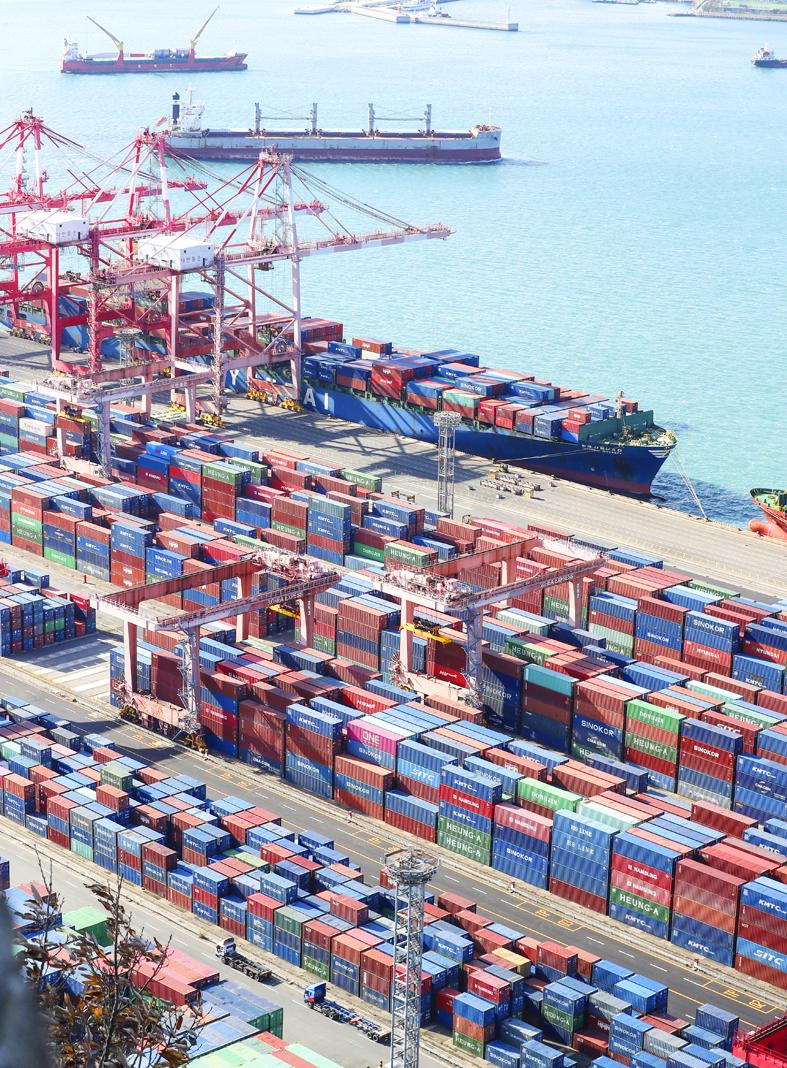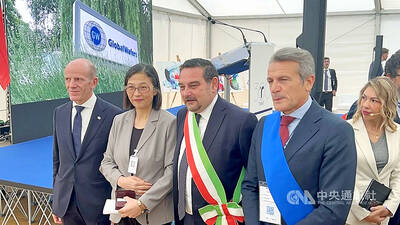Manufacturing activity in Asia outside China stabilized last month amid easing lockdown and border restrictions, setting the sector on course to face a possible new challenge from the Omicron variant of SARS-CoV-2.
Manufacturing purchasing managers’ indices (PMI) across Southeast Asia showed continued positivity, data released yesterday by IHS Markit showed.
Malaysia, Vietnam and the Philippines all saw rises in their PMIs, while Thailand’s saw a slight decline to 50.6, albeit still above the 50 reading that separates expansion from contraction.

Indonesia’s PMI saw a third month of expansion, but eased to 53.9 from 57.2 last month. The index rose to 57.6 in India — the highest reading since January.
In northern Asia, manufacturing activity in Taiwan and trade bellwether South Korea held in expansionary territory, while Japan’s PMI rose to 54.5, its highest since January 2018.
Meanwhile, separate data from South Korea out yesterday showed that exports last month rose more than expected and are headed for an annual record, buoyed by year-end holiday demand and higher product prices, even as supply chain bottlenecks continued to pressure manufacturers.
Exports rose 32.1 percent last month from a year earlier to a record US$60.4 billion, South Korean Ministry of Trade, Industry and Energy data showed.
Overseas shipments are on track to reach the highest annual value in the country’s trade history, the ministry said.
In Japan, a Ministry of Finance report released yesterday showed that Japanese firms cut investment last quarter for the first time in six months, as supply shortages hit activity and businesses grew cautious during a summer spike of COVID-19 that triggered emergency restrictions.
Capital expenditures, excluding those for software, declined 1.1 percent in the three months through September, compared with the prior quarter, the report said.
Both manufacturers and service firms cut investment, with spending by goods makers falling 1.5 percent amid supply chain snags.
News of the Omicron variant is seen as a potential threat to industrial production across the region after the Delta variant forced factories to shut and further snarled supply chains.
Factories across Southeast Asia especially had been on a recovery path, as loosened movement restrictions allowed production to catch up ahead of the crucial year-end holiday season.
The regional figures came a day after data showed China’s factory activity improved last month, as the impact of a power crunch subsided and more working days in the month helped boost output.
China’s official manufacturing PMI rose to 50.1, the first time in three months it exceeds the 50 mark. The non-manufacturing gauge, which measures activity in the construction and services sectors, fell slightly to 52.3.

RECYCLE: Taiwan would aid manufacturers in refining rare earths from discarded appliances, which would fit the nation’s circular economy goals, minister Kung said Taiwan would work with the US and Japan on a proposed cooperation initiative in response to Beijing’s newly announced rare earth export curbs, Minister of Economic Affairs Kung Ming-hsin (龔明鑫) said yesterday. China last week announced new restrictions requiring companies to obtain export licenses if their products contain more than 0.1 percent of Chinese-origin rare earths by value. US Secretary of the Treasury Scott Bessent on Wednesday responded by saying that Beijing was “unreliable” in its rare earths exports, adding that the US would “neither be commanded, nor controlled” by China, several media outlets reported. Japanese Minister of Finance Katsunobu Kato yesterday also

‘DRAMATIC AND POSITIVE’: AI growth would be better than it previously forecast and would stay robust even if the Chinese market became inaccessible for customers, it said Taiwan Semiconductor Manufacturing Co (TSMC, 台積電) yesterday raised its full-year revenue growth outlook after posting record profit for last quarter, despite growing market concern about an artificial intelligence (AI) bubble. The company said it expects revenue to expand about 35 percent year-on-year, driven mainly by faster-than-expected demand for leading-edge chips for AI applications. The world’s biggest contract chipmaker in July projected that revenue this year would expand about 30 percent in US dollar terms. The company also slightly hiked its capital expenditure for this year to US$40 billion to US$42 billion, compared with US$38 billion to US$42 billion it set previously. “AI demand actually

Jensen Huang (黃仁勳), founder and CEO of US-based artificial intelligence chip designer Nvidia Corp and Taiwan Semiconductor Manufacturing Co (TSMC, 台積電) on Friday celebrated the first Nvidia Blackwell wafer produced on US soil. Huang visited TSMC’s advanced wafer fab in the US state of Arizona and joined the Taiwanese chipmaker’s executives to witness the efforts to “build the infrastructure that powers the world’s AI factories, right here in America,” Nvidia said in a statement. At the event, Huang joined Y.L. Wang (王英郎), vice president of operations at TSMC, in signing their names on the Blackwell wafer to

Taiwan-based GlobalWafers Co., the world’s third largest silicon wafer supplier, on Wednesday opened a 12-inch silicon wafer plant in Novara, northern Italy - the country’s most advanced silicon wafer facility to date. The new plant, coded “Fab300,” was launched by GlobalWafers’ Italian subsidiary MEMC Electronics Materials S.p.A at a ceremony attended by Taiwan’s representative to Italy Vincent Tsai (蔡允中), MEMC President Marco Sciamanna and Novara Mayor Alessandro Canelli. GlobalWafers Chairwoman Doris Hsu (徐秀蘭) said the investment marked a milestone in the company’s expansion in Europe, adding that the Novara plant will be powered entirely by renewable energy - a reflection of its